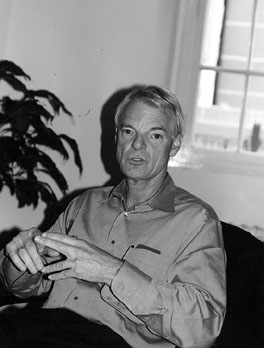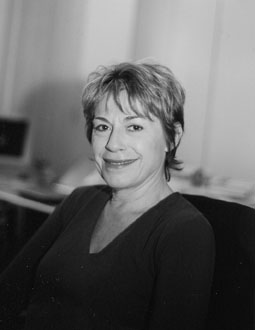Interview mit Michael Spence
 Am
3.6.02 war der Nobelpreisträger für Ökonomie Michael Spence anlässlich
eines Vortages in unserer Fakultät. Wir hatten die Möglichkeit vor
seinem Vortrag ein kurzes Interview mit ihm und seiner Frau Monika zu führen.
Am
3.6.02 war der Nobelpreisträger für Ökonomie Michael Spence anlässlich
eines Vortages in unserer Fakultät. Wir hatten die Möglichkeit vor
seinem Vortrag ein kurzes Interview mit ihm und seiner Frau Monika zu führen.
Hermes: Did you expect that you would earn the Nobel Price while writing your
paper „Job Market Signalling“?
Michael Spence: Aeh, no. I tell you what I did think. I knew enough the economics
by then and I became a good enough economist, not just mathematically but in
other ways, in a kind intuitively. I was on my way to become a reasonable, good
applied economic theorist, somebody who on some level really understood how
markets are trying to accomplish things and not just in a simple way. And when
I saw the signaling model, I knew immediately what its properties were because
I studied differential equations in Oxford and I knew it was a different kind
of equilibrium, and I thought it was important. It would probably make a difference.
But that‘s as far as I got. I wasn‘t thinking about prices, first
of all Nobel price didn‘t exist. They just had not created it (Anmerkung
der Red.: Der Nobelpreis für Ökonomie von Sveriges Riksbank existiert
erst seit 1968, im Gegensatz zu Physik etc.). So the answer is no. And I wasn‘t
expecting it the day they called either.
Hermes: What did it mean to you to get the Nobel Price?
Michael Spence: Well, I think the way to think about the Nobel Price is that
people who could get into fields like ours, they get into it because they love
doing it, they love working on things that interest them, as opposed to what
other people do, so I think the way to cope with this is: pick something interesting
and make a real contribution and then the rest is just luck. There are a lot
of people who have done wonderful work in economics, and I think it really is
luck when you stumble on something that turns out to be different enough to
get recognized. There are probably exceptions, I think Samuelson and Arrow and
Becker probably would have got it under any circumstances, but for me I think
it was being lucky. And I think so the bottom line is: don‘t think about
it. Just do what you love to do and make a contribution and maybe get struck
by a lightning.
Hermes: Do you still have a private life being a Nobel
Prize laureate or does the scientific work rules your private life?
Monica Spence: It probably already has before.
Michael Spence: Well, there is no question that two things happen when you receive
the Nobel price. And to be honest with you, we have finished conducting the
experiment of observing what happens. But I will say that I think that you all
of a sudden become visible beyond the boundaries of your field. And you probably
acquire something of a voice. So unless you are determined to ignore the whole
thing, you have to decide what you are going to do with that voice. And you
have to decide in the phase of a huge onslaught of request. So my decision is:
I would like to focus on things that interest me and I would like to be more
closely associated with academics, particularly young academics, students and
young faculty around the world because I care about them, and what I am less
interested in is sort of high visibility. I don‘t mind doing it if it is
part of the process as it was in China these last three weeks. But I think the
bottom line is what changes your life permanently: you are more visible for
the rest of your life. You carry this label, in the first 100 years it‘s
only 750 people. So I don‘t want to be naive about it. I does make a big
difference. But I don‘t think that you loose your privacy or anything like.
Monika Spence: I think it makes a difference how old you are. We are happy that
we can travel together, we can handle it together.
Michael Spence: We have a daughter who has one more year of high school. We
have been traveling a lot, we have tried to tone it down next year until she
gets launched.
 Hermes:
Do you have hobbies?
Hermes:
Do you have hobbies?
Michael Spence: Yes, aehm, I like football. I grew up playing icehockey.
Hermes: Soccer or football?
Michael Spence: American football. We have a place in Hawaii to which we go
regularly, where we sort of run and exercise a lot together, stuff like that.
We both have BMW motorcycles. I am a windsurfer, Hawaii is a pretty good place
to do that. We like to read, we love to travel, Monika was doing traveling in
business for 25 years and really knows parts of the world that, if you are just
a person who hasn‘t worked in it, you don‘t know. Sub-saharian Africa,
large parts of India, stuff like that. Monika organizes all the traveling.
Hermes: What amount of money or other incentives would
be necessary to get you to our university?
Michael Spence: I love teaching, so the answer is probably „Not much“.
We have been very lucky in the sense that money isn‘t really much a issue
for us any more. And I do mean luck, I mean we have resources that we shouldn‘t
have.
Hermes: We thank you for the conversation.
 Am
3.6.02 war der Nobelpreisträger für Ökonomie Michael Spence anlässlich
eines Vortages in unserer Fakultät. Wir hatten die Möglichkeit vor
seinem Vortrag ein kurzes Interview mit ihm und seiner Frau Monika zu führen.
Am
3.6.02 war der Nobelpreisträger für Ökonomie Michael Spence anlässlich
eines Vortages in unserer Fakultät. Wir hatten die Möglichkeit vor
seinem Vortrag ein kurzes Interview mit ihm und seiner Frau Monika zu führen. Hermes:
Do you have hobbies?
Hermes:
Do you have hobbies?